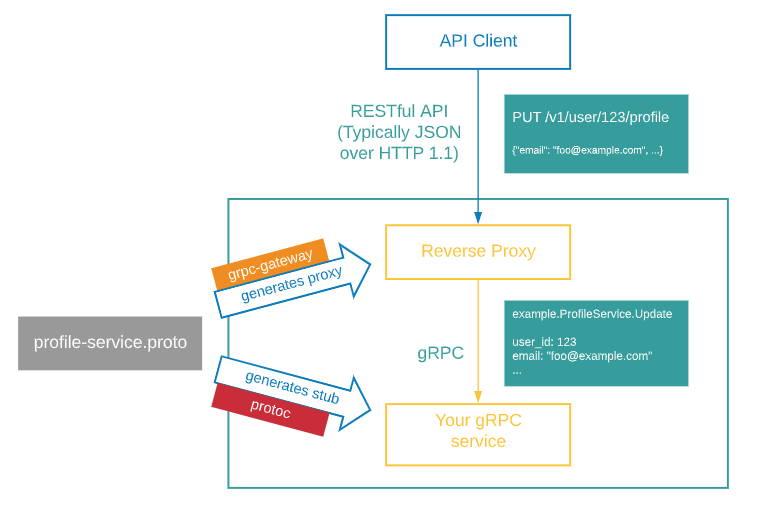golang - grpc-gateway

grpc-gateway는 간략하게 grpc와 http를 같이 사용하기 위한 플러그인입니다. 위의 형상대로 구성되어 있으며, production 환경에서 사용할 경우에 빌드환경을 하나의 도커 이미지로 만들어서 빌드환경을 통일합니다. 현재 문서에서는 공식 가이드대로 설치 과정을 기술하였습니다.:happy:
gRPC-gateway Doc
https://grpc-ecosystem.github.io/grpc-gateway/docs/development/
사전 준비사항
- go get grpc-gateway
// go 버전에 따라 install로 설치
go get github.com/grpc-ecosystem/grpc-gateway/v2/protoc-gen-grpc-gateway
go get google.golang.org/protobuf/cmd/protoc-gen-go
go get google.golang.org/grpc/cmd/protoc-gen-go-grpc
- go mod init
go mod init github.com/myuser/myrepo
- directory
공식 문서에 디렉토리 구조를 보면 google/api/annotion.proto, google/api/annotion.proto 두개 파일이 존재하는 것을 확인 할 수 있습니다. 저는 아래 구조로 구성하지 않았으며 해당 프로젝트를 현재 디렉토리에 받아 구성하였습니다.
proto
├── google
│ └── api
│ ├── annotations.proto
│ └── http.proto
└── helloworld
└── hello_world.proto
- git clone
google/api/annotion.proto, google/api/annotion.proto 프로젝트를 받아 오는 작업입니다.
git clone https://github.com/googleapis/googleapis.git
- proto
syntax = "proto3";
package helloworld;
import "google/api/annotations.proto";
// Here is the overall greeting service definition where we define all our endpoints
service Greeter {
// Sends a greeting
rpc SayHello (HelloRequest) returns (HelloReply) {
option (google.api.http) = {
post: "/v1/example/echo"
body: "*"
};
}
}
// The request message containing the user's name
message HelloRequest {
string name = 1;
}
// The response message containing the greetings
message HelloReply {
string message = 1;
}
- build
-I옵션으로 git clone으로 받은 프로젝트를 import하는 것을 확인 하실 수 있습니다.
protoc -I ./googleapis -I ./proto --go_out ./proto --go_opt paths=source_relative --go-grpc_out ./proto --go-grpc_opt paths=source_relative --grpc-gateway_out ./proto --grpc-gateway_opt paths=source_relative ./proto/helloworld/hello_world.proto
사용법
- grpc port와 grpc-gateway port가 같지 않을 경우
package main
import (
"context"
"log"
"net"
"net/http"
"github.com/grpc-ecosystem/grpc-gateway/v2/runtime"
"google.golang.org/grpc"
"google.golang.org/grpc/credentials/insecure"
helloworldpb "github.com/myuser/myrepo/proto/helloworld"
)
// implement grpc method
type server struct {
helloworldpb.UnimplementedGreeterServer
}
func NewServer() *server {
return &server{}
}
func (s *server) SayHello(ctx context.Context, in *helloworldpb.HelloRequest) (*helloworldpb.HelloReply, error) {
return &helloworldpb.HelloReply{Message: in.Name + " world"}, nil
}
func main() {
// Create a listener on TCP port
lis, err := net.Listen("tcp", ":8080")
if err != nil {
log.Fatalln("Failed to listen:", err)
}
// Create a gRPC server object
s := grpc.NewServer()
// Attach the Greeter service to the server
helloworldpb.RegisterGreeterServer(s, &server{})
// Serve gRPC server
log.Println("Serving gRPC on 0.0.0.0:8080")
go func() {
log.Fatalln(s.Serve(lis))
}()
// Create a client connection to the gRPC server we just started
// This is where the gRPC-Gateway proxies the requests
conn, err := grpc.DialContext(
context.Background(),
"0.0.0.0:8080",
grpc.WithBlock(),
grpc.WithTransportCredentials(insecure.NewCredentials()),
)
if err != nil {
log.Fatalln("Failed to dial server:", err)
}
gwmux := runtime.NewServeMux()
// Register Greeter
err = helloworldpb.RegisterGreeterHandler(context.Background(), gwmux, conn)
if err != nil {
log.Fatalln("Failed to register gateway:", err)
}
gwServer := &http.Server{
Addr: ":8090",
Handler: gwmux,
}
log.Println("Serving gRPC-Gateway on http://0.0.0.0:8090")
log.Fatalln(gwServer.ListenAndServe())
}
- grpc port와 grpc-gateway port가 같은 경우
package main
import (
"context"
"net/http"
"strings"
"github.com/grpc-ecosystem/grpc-gateway/v2/runtime"
"golang.org/x/net/http2"
"golang.org/x/net/http2/h2c"
"google.golang.org/grpc"
"google.golang.org/protobuf/encoding/protojson"
helloworldpb "github.com/myuser/myrepo/proto/helloworld"
)
// implement grpc method
type server struct {
helloworldpb.UnimplementedGreeterServer
}
func NewServer() *server {
return &server{}
}
func (s *server) SayHello(ctx context.Context, in *helloworldpb.HelloRequest) (*helloworldpb.HelloReply, error) {
return &helloworldpb.HelloReply{Message: in.Name + " world"}, nil
}
func allHandler(grpcServer *grpc.Server, httpHandler http.Handler) http.Handler {
return h2c.NewHandler(http.HandlerFunc(func(w http.ResponseWriter, r *http.Request) {
if r.ProtoMajor == 2 && strings.Contains(r.Header.Get("Content-Type"), "application/grpc") {
grpcServer.ServeHTTP(w, r)
} else {
httpHandler.ServeHTTP(w, r)
}
}), &http2.Server{})
}
func main() {
// create context
ctx := context.Background()
ctx, cancel := context.WithCancel(ctx)
defer cancel()
// create grpc server
grpcServer := grpc.NewServer()
// register pb
helloworldpb.RegisterGreeterServer(grpcServer, &server{})
mux := runtime.NewServeMux(
runtime.WithMarshalerOption(runtime.MIMEWildcard, &runtime.HTTPBodyMarshaler{
Marshaler: &runtime.JSONPb{
MarshalOptions: protojson.MarshalOptions{
UseProtoNames: true,
EmitUnpopulated: true,
},
UnmarshalOptions: protojson.UnmarshalOptions{
DiscardUnknown: true,
},
},
}),
)
addr := ":8080"
opts := []grpc.DialOption{grpc.WithInsecure()}
if err := helloworldpb.RegisterGreeterHandlerFromEndpoint(ctx, mux, addr, opts); err != nil {
panic(err)
}
if err := http.ListenAndServe(addr, allHandler(grpcServer, mux)); err != nil {
panic(err)
}
}
마치며
grpc-gateway를 같은 포트로 사용할 때 자료가 부족하여 찾아본 경험이 있습니다. 따로 구성하여도 되지만 특별한 상황으로 같은 포트를 사용할 수 있는데 위와 같은 방법으로 구성해보시면 좋을 꺼 같습니다 ![]()
추후에 도커를 사용하여 빌드 환경을 통일하는 방법에 대해서 말씀드릴려고 합니다.

댓글남기기